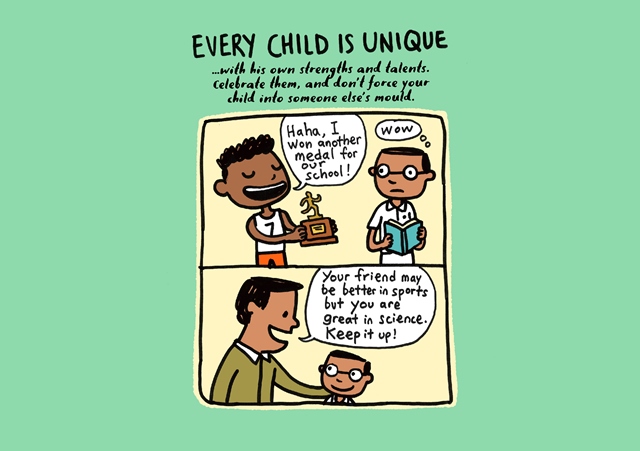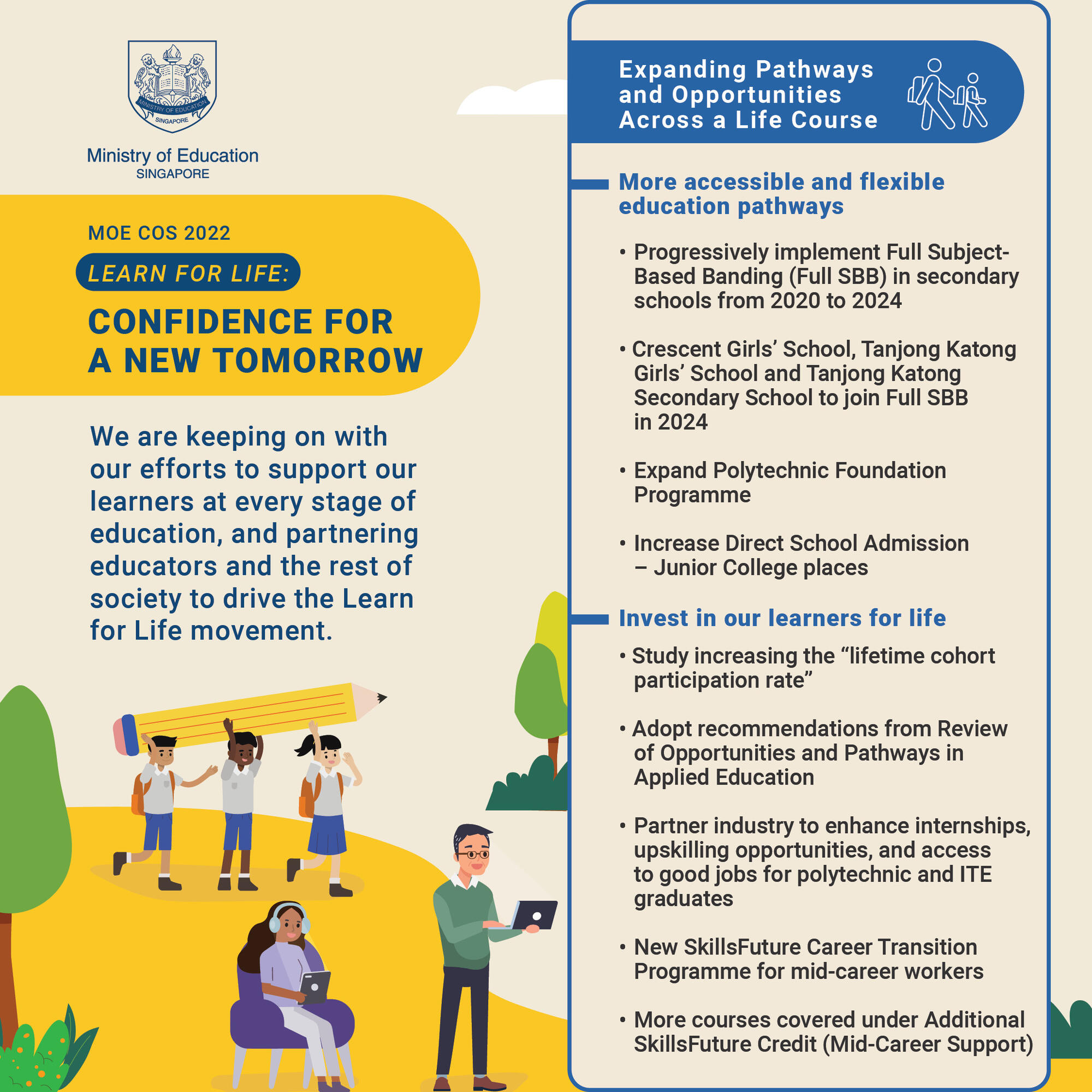Passion Plays
08 Dec 2015

Want to help your children figure out what they excel at? One father shares how he guided each of his four kids to harness their unique talents – even when it meant taking a deliberate detour from the tried-and-tested JC path.
For Mr Edwin Choy, 53, a certified family coach and co-founder of The Centre for Fathering, helping his children to succeed in life is all about playing to their passions and guiding them to pursue what truly inspires them.
That’s why when his children opted for a polytechnic education – even when their grades qualified them for junior college – he was neither surprised nor bothered.
“I believe education is not so much about getting good grades but more about discovering and pursuing one’s passion,” he says. “They’ll excel when they pursue what they’re passionate about.”
It’s a parenting philosophy he and his wife have practised conscientiously since their four children, Cailin, 26, Ryan, 23, Brynna, 18, and Nathaniel, 17 were little kids.
Attuned to their world
The journey to unearthing their children’s individual strengths and weaknesses started with building a foundation for lifelong learning – beyond the classroom.
Mr Choy spent a lot of time with them in their growing-up years, exposing them to as many diverse experiences as possible, whether it was reading, watching musicals as a family or exploring Sungei Buloh and the zoo. “We turned music and nature into their classrooms,” he says of their decision to pursue “fun experiences that offered creative exposure.”
“I’ve always played a lot with my kids,” he recalls. “I taught each of my children first to cycle, then to rollerblade and swim. When I teach them a skill, I’m also growing their confidence.”
Not only did these experiences help Mr Choy create positive memories for him and his children, they also cemented their relationship with one another. However, he has always remained mindful of the need to avoid “judging them based on their performance.”
“I don’t relate to my kids based on how well they do,” he says. “Especially when kids are younger, they need to feel loved and develop a sense of belonging. They need to feel secure and close enough so that when they go through the rough teenage years, you still have something to work with.”
It was also through playing and spending time with his children that Mr Choy began to identify each child’s interests and aspirations. “Be observant,” he advises. “Respect the differences in each child and never have the concept that they must all do the same thing.”
His second child Ryan showed an interest in the arts from the age of three with his endless doodling and eventually pursued a diploma in animation. His third, Brynna, always showed compassion and a nurturing attitude towards animals as a child, and is now completing her final year in veterinary technology at Temasek Polytechnic.
His eldest, Cailin, who has an outgoing personality and good people skills, went on to earn a communications diploma and a business degree. She recently took a year off to do missionary work with inner-city kids in Texas. The youngest, Nathaniel, will soon begin pursuing a diploma in mechanical engineering at Ngee Ann Polytechnic. As a child, his penchant for order and structure was obvious in the way he lined up his toy soldiers in neat rows.
Looking beyond grades
For Mr Choy, encouraging and engaging his children’s interests was always more important than their grades. “You need to have a broader view of education,” he says. “A child is worth more than their grades.”
He adds, “If you help a child feel good only when they do well, you’re inevitably constantly putting them down.”
In his household, it was always a “non-event” when his kids brought home their report cards.
“When you go out to work, it doesn’t matter what degree you have,” he says. “It’s how you relate to people, your value systems, that make the difference.” Rather than chasing distinctions, he focuses on imparting principles of kindness, generosity and compassion – values that he hopes will guide their decisions throughout life.
He recalls how he beamed with pride when Cailin’s secondary school teacher told him how she had reached out to befriend a girl who was caught stealing the wallets of her classmates, including Cailin’s own. “When Cailin called to tell me what had happened in class, I remember telling her, ‘Poor girl. She must be very lonely right now. She probably needs a friend.’”
“It’s instances like these that shape their sense of values and character,” Mr Choy says.
Coach and confidante
Mr Choy also believes in being generous with praise, offering affirmation of their goodness and celebrating their accomplishments. “By constantly highlighting what I‘ve noticed are their strengths, they in turn develop greater interests in those areas,” he says.
While some parents might frown upon the arts as a career option, Mr Choy and his wife adopted a different attitude, spurring Ryan to “just continue doing what you’re passionate about.” Even when Ryan started questioning his career prospects and potential earnings while he was in polytechnic, they encouraged him to look beyond the money.
“In fact, he discovered his interest was not in animation but in concept art,” Mr Choy says. “I thought that was a great direction. If you’re good at art, it can lead to all kinds of vocations.” This year, Ryan will pursue a degree in illustration at the Singapore Institute of Technology.
Though it’s important to support your children’s pursuit of their passions, Mr Choy also makes it a point to highlight the challenges that derive from their choices. When Ryan decided on a career in the creative industry, Mr Choy cautioned him about the long hours and deadline pressures. When Cailin came to a crossroad after obtaining her communications diploma, he arranged for chats with his friends in the industry to help her decide on her choice of undergraduate studies. In the end, she chose to read business, which has complemented her media training well.
“I tell them the implications of being in the careers they’re interested in, but without too much of a put-down,” he says. “And at the end of day, it’s still their decision.”
As his children have grown older, Mr Choy has seen his role evolve to that of a coach. In fact, it has become family tradition for Mr Choy to sit with each of his children after their O-Level to administer the Myers-Briggs Type Indicator (MBTI) to help them make choices about their most suitable field of study. The test helps people assess their options based on their personality and temperament.
“It’s a tool and basis for us to have a dialogue and it also helps to confirm what they already know about themselves,” says Mr Choy, a certified MBTI user and trainer.
Using questions along the lines of “What appeals to you?” and “What do you care for the most?”, he guides them to share what they enjoy doing. What’s critical is that parents keep an open mind.
“Instead of critiquing or being quick to judge, offer unbiased comments,” he advises. “It’s just an idea that they’re sharing. Don’t direct them to a place you want them to go. Instead, see yourself as a facilitator.”
Living their dreams
Mr Choy’s approach has worked well so far. Each of his kids has done well in their chosen fields of study and, more importantly, enjoyed their learning journeys. “I hardly have to tell them to do their homework,” he says.
In fact, Cailin graduated as valedictorian from Temasek Polytechnic . The critical learning, industrial focus and the opportunity to interact with industry professionals suited her learning style and helped pave the way for her career.
His advice to parents? Listen to your child and support them with love and compassion. “I don’t believe in perfect parents. I believe in loving a child perfectly,” he says. “Whether they make mistakes or the right choice, I have to be there for them. There’s no one-size-fits-all solution.”





